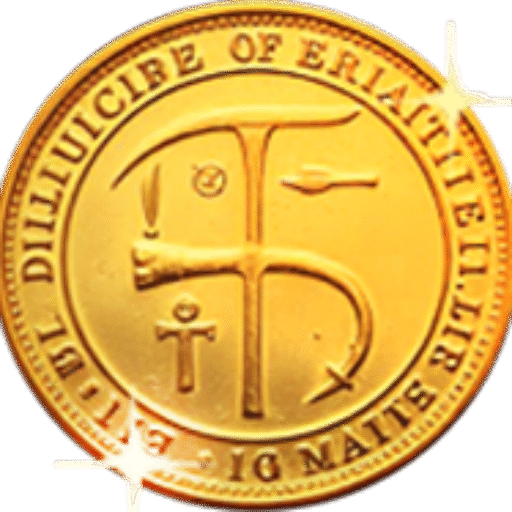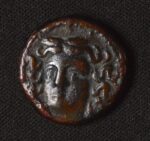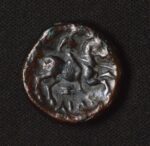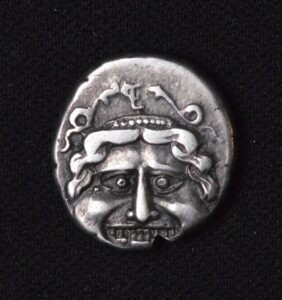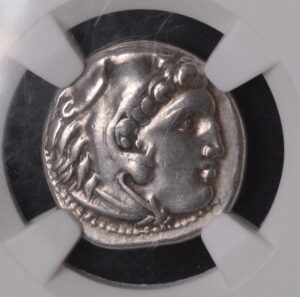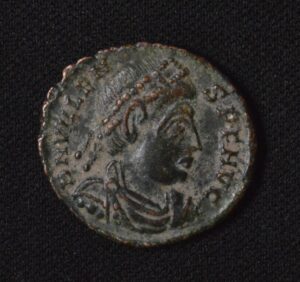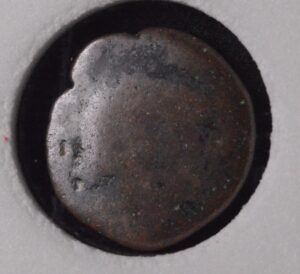FREE SHIPPING
Free Shipping for Orders over $150
Description
The Thessaly Larissa Dichalkon, minted between 400-344 BC, is a beautiful and historically significant ancient Greek bronze coin that remains highly popular among collectors for its artistry, rarity, and unique connection to the region of Thessaly. This coin comes from Larissa, one of the most influential cities in Thessaly, which served as a major political and cultural hub during the Classical period.
On the obverse, these coins typically feature the captivating three-quarters facing portrait of the nymph Larissa. The nymph is depicted with delicate features, wearing an ampyx and jewelry, exuding elegance and the artistic sophistication of Greek coin engravers. The portrait’s realistic execution and charm help distinguish this coin as one of the more attractive bronze issues of its time, celebrated for its refined aesthetic and mythological resonance.
The reverse generally showcases a dynamic image of a horseman advancing right, sometimes holding a lance, or a horse grazing or trotting. Thessaly was renowned for its cavalry and horse breeding, so equestrian motifs on Larissa coinage symbolize both local pride and the region’s military strength. The vivid scene reflects ancient Greece’s admiration for horsemanship and the pastoral beauty of central Thessaly, making these reverses highly sought-after by collectors worldwide.
Weighing around 4.8 grams with a diameter of approximately 17-20 mm, the Dichalkon is sizable for a small bronze coin and is notable for its robust design and well-struck details even after centuries. Its attractive condition—often with pleasing patina and clear imagery—makes it a favorite for those seeking both artistic beauty and ancient authenticity in a collection.
A Thessaly Larissa Dichalkon from 400-344 BC is more than a remarkable artifact; it’s a direct link to the values, identity, and mythology of one of Greece’s most storied regions. Whether for display, study, or investment, this coin exemplifies the intersection of art and history, offering collectors a rare glimpse into the daily life, culture, and civic pride of Classical Thessaly.
The Thessaly Larissa Dichalkon, minted between 400-344 BC, is a beautiful and historically significant ancient Greek bronze coin that remains highly popular among collectors for its artistry, rarity, and unique connection to the region of Thessaly. This coin comes from Larissa, one of the most influential cities in Thessaly, which served as a major political and cultural hub during the Classical period.
On the obverse, these coins typically feature the captivating three-quarters facing portrait of the nymph Larissa. The nymph is depicted with delicate features, wearing an ampyx and jewelry, exuding elegance and the artistic sophistication of Greek coin engravers. The portrait’s realistic execution and charm help distinguish this coin as one of the more attractive bronze issues of its time, celebrated for its refined aesthetic and mythological resonance.
The reverse generally showcases a dynamic image of a horseman advancing right, sometimes holding a lance, or a horse grazing or trotting. Thessaly was renowned for its cavalry and horse breeding, so equestrian motifs on Larissa coinage symbolize both local pride and the region’s military strength. The vivid scene reflects ancient Greece’s admiration for horsemanship and the pastoral beauty of central Thessaly, making these reverses highly sought-after by collectors worldwide.
Weighing around 4.8 grams with a diameter of approximately 17-20 mm, the Dichalkon is sizable for a small bronze coin and is notable for its robust design and well-struck details even after centuries. Its attractive condition—often with pleasing patina and clear imagery—makes it a favorite for those seeking both artistic beauty and ancient authenticity in a collection.
A Thessaly Larissa Dichalkon from 400-344 BC is more than a remarkable artifact; it’s a direct link to the values, identity, and mythology of one of Greece’s most storied regions. Whether for display, study, or investment, this coin exemplifies the intersection of art and history, offering collectors a rare glimpse into the daily life, culture, and civic pride of Classical Thessaly.
The Thessaly Larissa Dichalkon, minted between 400-344 BC, is a beautiful and historically significant ancient Greek bronze coin that remains highly popular among collectors for its artistry, rarity, and unique connection to the region of Thessaly. This coin comes from Larissa, one of the most influential cities in Thessaly, which served as a major political and cultural hub during the Classical period.
On the obverse, these coins typically feature the captivating three-quarters facing portrait of the nymph Larissa. The nymph is depicted with delicate features, wearing an ampyx and jewelry, exuding elegance and the artistic sophistication of Greek coin engravers. The portrait’s realistic execution and charm help distinguish this coin as one of the more attractive bronze issues of its time, celebrated for its refined aesthetic and mythological resonance.
The reverse generally showcases a dynamic image of a horseman advancing right, sometimes holding a lance, or a horse grazing or trotting. Thessaly was renowned for its cavalry and horse breeding, so equestrian motifs on Larissa coinage symbolize both local pride and the region’s military strength. The vivid scene reflects ancient Greece’s admiration for horsemanship and the pastoral beauty of central Thessaly, making these reverses highly sought-after by collectors worldwide.
Weighing around 4.8 grams with a diameter of approximately 17-20 mm, the Dichalkon is sizable for a small bronze coin and is notable for its robust design and well-struck details even after centuries. Its attractive condition—often with pleasing patina and clear imagery—makes it a favorite for those seeking both artistic beauty and ancient authenticity in a collection.
A Thessaly Larissa Dichalkon from 400-344 BC is more than a remarkable artifact; it’s a direct link to the values, identity, and mythology of one of Greece’s most storied regions. Whether for display, study, or investment, this coin exemplifies the intersection of art and history, offering collectors a rare glimpse into the daily life, culture, and civic pride of Classical Thessaly.
CUSTOMER FEEDBACK




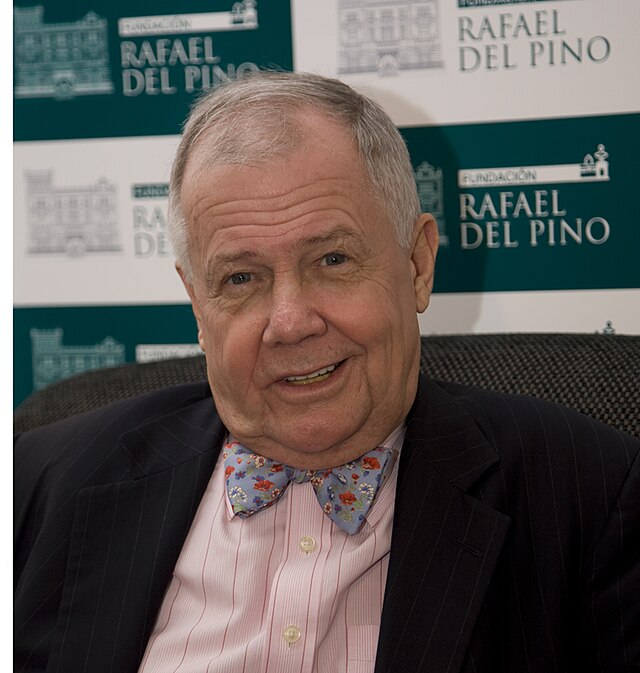



Related Products




SHIPPING POLICY
Your order is shipped from the United States with USPS tracking within one business day.
14 Day Return Policy
You can return your item back within
14 days of the purchase

Secure payments
Your payments are 100% secure and are processed through Square or PayPal on a protected security network.
SHIPPING POLICY
FREE International and Domestic (United States) shipping. Your order is shipped with USPS tracking 24 hours after you order.
14 Day Return Policy
You can return your item back within
14 days of the purchase

Secure payments
Your payments are 100% secure and are processed through Square or PayPal on a protected security network.
RESOURCES
support
Get Fresh Articles!
Sign up now to receive our articles for the latest insights and promotions!
RESOURCES
support
Get Fresh Articles!
Signup our newsletter to get update insight or promotions.

